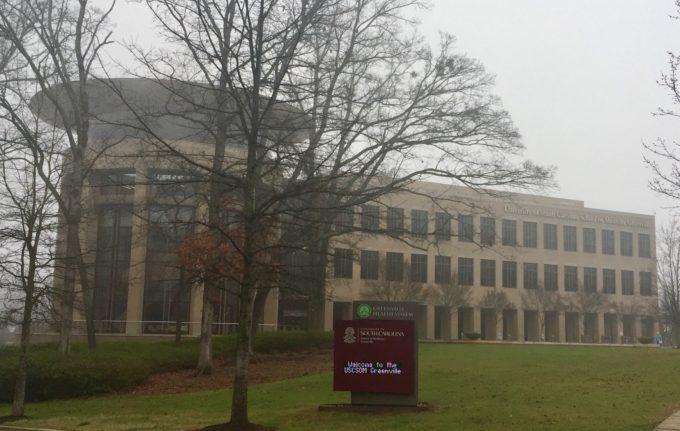
Get the latest articles delivered directly to your inbox!
Our Contributors
Class of 2022
Kyle Duke
Austin Foster
Charlotte Leblang
Ross Lordo
Class of 2021
Dory Askins
Connor Brunson
Keiko Cooley
Mason Jackson
Class of 2020
Megan Angermayer
Carrie Bailes
Leanne Brechtel
Hope Conrad
Alexis del Vecchio
Brantley Dick
Scott Farley
Irina Geiculescu
Alex Hartman
Zegilor Laney
Julia Moss
Josh Schammel
Raychel Simpson
Teodora Stoikov
Anna Tarasidis
Class of 2019
Michael Alexander
Caitlin Li
Ben Snyder
Class of 2018
Alyssa Adkins
Tee Griscom
Stephen Hudson
Eleasa Hulon
Hannah Kline
Andrew Lee
Noah Smith
Crystal Sosa
Jeremiah White
Jessica Williams
Class of 2017
Carly Atwood
Laura Cook
Ben DeMarco
Rachel Nelson
Megan Epperson
Rachel Heidt
Tori Seigler
Class of 2016
Shea Ray
Matt Eisenstat
Eric Fulmer
Geevan George
Maglin Halsey
Jennifer Reinovsky
Kyle Townsend
Join USCSOMG students on their journeys to becoming exceptional physician leaders.

The Road to Cynicism: Remembering our Privilege
A couple years ago, I wrote about the privilege of becoming a physician. When I wrote that, I was still far removed from the clinical environment. I did not have a true appreciation for the complexities of everyday life in the hospital. I wrote that as aspiring physicians it is imperative for us to not be owned by our privilege but to instead esteem our work as the highest privilege. These facts have remained unchanged in my mind, but I have now come to face the challenges of maintaining such an attitude and posture.
I was warned during the transition from second to third year that moving from preclinical to clinical often coincides with a transtition form “pre-cynical to cynical” as stated by Abraham Verghese. With bright eyes a the beginning of the third year of medical school, and with an expectation for the good that I could effect in the lives of patients, I viewed this quote merely as another cynical warning against the dangers of high expectations. However, as the year has progressed, I have watched the battle within myself to not begin assuming the worst of patients, to continue to regard their humanity and worth, and to not blame and judge them for the condition in which they present for care. I have watched as I have begun to develop the very cynicism and negativity that I thought to be far from me.
The process of medical training is challenging, and it interjects many obstacles to the more human aspects of medicine. We become focused on the science and the work. The work is daunting and seemingly never-ending. We begin to view people as problems to be solved or transgressors to be fixed so that we can get them out of the hospital or “off of our list.” Paternalism still exists in medicine in the way that we view our work and responsibility. Under the service, paternalism lingers as we at times esteem ourselves above our patients. It remains in the vestiges of cynicism that overwhelm our practice and caring. It is seen when we fail to ask clarifying questions, when we assume rather than verify, when we take no interest in our patients’ lives. However, it is easy to convince ourselves that the disconnection of the caregiver from the care-receiver is a necessary part of our time-sensitive system. The time demands are significant to admit, document, communicate with other providers, discharge, order tests, interpret results, and to continue learning. All of these things are necessary in the work we do, but how can we make time to ensure that our practice consists of more than just identifying problems, searching for solutions, and then moving on to the next problem? How do we make time to connect to our patients and truly understand that their needs are often more than simply medical?
As medicine and the world continues to evolve, we will begin to see the limitations of dehumanized and unengaged medicine. We will find continued and unbreakable obstacles to the therapies we prescribe if we are unwilling to slow down enough to evaluate and understand our patients beyond their diagnoses. If we continue to look only on the inconveniences, to assume noncompliance, and to view ourselves too highly, we will find that much of our work and striving has been in vain. If we do not view medicine as a privilege, if we do not see how privileged we are to stare deep into the most intimate details of our patients’ lives, we will find that cynicism and negativity have won. Only a proactive approach can stop this transition from pre-cynical to cynical, which has already begun in so many of us. Instead of the unconscious assimilation of distrust, bitterness and pessimism, our efforts must be directed to conscious resistance from the earliest days in our training. To truly change the world and change lives, we must remember that we are unbelievably privileged to practice medicine. Every patient encounter is an opportunity to care for another human being. If we open our eyes to see how our attitude becomes our enemy in this endeavor when we give into cynicism, we will also find the opportunity to gain a different perspective and start treating patients the way we desired to from the start.
I was born and raised in Cincinnati, Ohio. After graduating high school, I attended Liberty University in Virginia for my undergraduate studies and graduated in December of 2014 with a degree in cell and molecular biology. At Liberty, I participated in student leadership as a Resident Assistant and Spiritual Life Director. I met my wife through student leadership, and we got married in January 2015. I have wanted to be a doctor since very early in life, and I am very grateful to have the opportunity to study and learn at the USC School of Medicine Greenville. It is my desire to one day use medicine in missions work and to provide care to the underserved.
Copyright 2021 USC School of Medicine Greenville


